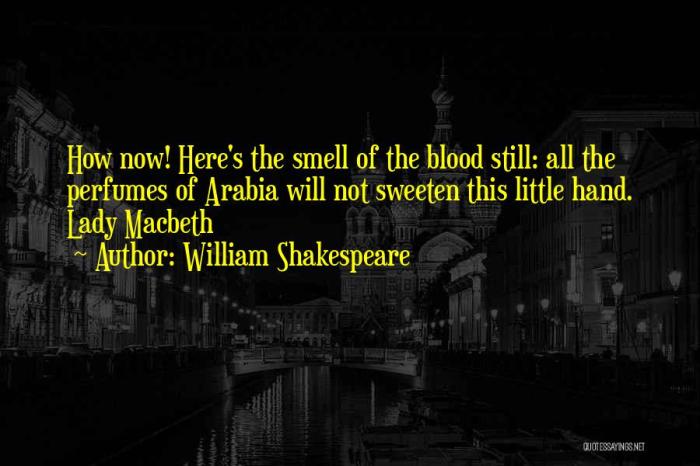As quotes about blood in Macbeth take center stage, this opening passage beckons readers into a world where blood is more than just a physical substance. It is a symbol of guilt, violence, and the struggle for redemption.
Throughout the play, blood stains the hands and minds of Macbeth and Lady Macbeth, leaving an indelible mark on their souls. This essay will delve into the significance of blood in Macbeth, exploring its role as a symbol, its impact on the characters, and its connection to themes of violence, fate, and redemption.
Quotes about Blood in Macbeth

The theme of blood permeates the play Macbeth, symbolizing guilt, violence, and the consequences of evil actions. Throughout the play, Shakespeare uses evocative language to describe blood, creating a powerful and disturbing atmosphere.
Notable Quotes about Blood
- “Will all great Neptune’s ocean wash this blood/ Clean from my hand? No, this my hand will rather/ The multitudinous seas incarnadine,/ Making the green one red.” (Act II, Scene ii)
- “Here’s the smell of the blood still: all the perfumes of Arabia will not sweeten this little hand.” (Act V, Scene i)
- “Blood will have blood.” (Act III, Scene iv)
- “Wake up, Duncan with this knocking! I wish thou couldst!” (Act II, Scene ii)
- “Out, damned spot! out, I say!” (Act V, Scene i)
These quotes highlight the profound impact of blood on the characters in Macbeth. They reveal the characters’ guilt, fear, and desperation as they grapple with the consequences of their actions.
Blood as a Symbol in Macbeth

Blood plays a central role in Macbeth, serving as a potent symbol with multiple meanings and interpretations. It represents guilt, violence, and the corrupting power of ambition.
Guilt and Corruption
The sight of blood evokes feelings of guilt and shame in Macbeth. After murdering Duncan, he sees Banquo’s ghost and exclaims, “Avaunt! and quit my sight! Let the earth hide thee! Thy bones are marrowless, thy blood is cold.” The blood on his hands becomes a constant reminder of his crime, driving him to further acts of violence to conceal his guilt.
Violence and Cruelty
Blood also symbolizes the violence and cruelty that pervades the play. The witches’ prophecy that Macbeth will become Thane of Cawdor and King of Scotland leads him down a path of murder and bloodshed. Each killing further stains his hands with blood, creating a cycle of violence that ultimately leads to his downfall.
Ambition and Power, Quotes about blood in macbeth
Finally, blood represents the corrupting power of ambition. Macbeth’s desire for power drives him to commit heinous crimes, and the blood he sheds becomes a symbol of his ambition’s destructive nature. The play suggests that the pursuit of power often comes at a great cost, both morally and physically.
The Role of Blood in Macbeth’s Character: Quotes About Blood In Macbeth
Blood is a potent symbol throughout William Shakespeare’s Macbeth. It represents violence, guilt, and the erosion of Macbeth’s humanity as he descends into darkness.
Macbeth’s first encounter with blood occurs when he kills Duncan. This act, motivated by ambition, sets him on a path of destruction. As he continues to murder, the blood of his victims stains his hands and soul, weighing heavily on his conscience.
Macbeth’s Descent into Darkness
- Guilt:The blood of Duncan haunts Macbeth, causing him to hallucinate and experience overwhelming guilt.
- Isolation:As Macbeth’s guilt grows, he becomes isolated from those around him, including his wife, Lady Macbeth.
- Paranoia:Macbeth’s fear of retribution drives him to paranoia, leading him to suspect and kill even his closest allies.
- Desensitization:The repeated acts of violence desensitize Macbeth to blood, making him increasingly ruthless and callous.
By the play’s end, Macbeth has become a tyrant, consumed by bloodlust and guilt. The blood of his victims has transformed him into a monster, a far cry from the honorable soldier he once was.
Blood and Violence in Macbeth

Violence and blood are central to the plot and themes of Macbeth. The play’s opening scene sets the tone with the witches’ prophecies and the murder of Duncan. From this point forward, violence becomes a recurring motif, as Macbeth’s ambition and guilt lead him to commit increasingly heinous acts.
The bloodshed in Macbeth is not merely gratuitous; it serves several important functions. First, it reflects the play’s central themes of ambition, guilt, and the destructive nature of power. As Macbeth’s body count rises, so too does his sense of guilt and paranoia.
The blood on his hands becomes a constant reminder of his crimes, and it ultimately leads to his downfall.
Second, the violence in Macbeth creates a sense of suspense and horror. The audience is constantly on edge, waiting for the next act of violence to occur. This tension is heightened by the play’s use of foreshadowing, as the witches’ prophecies and Macbeth’s own dreams hint at the terrible events that are to come.
Finally, the violence in Macbeth serves to underscore the play’s tragic nature. Macbeth is a deeply flawed character, and his actions ultimately lead to his own destruction. The bloodshed that surrounds him is a reminder of the consequences of his choices, and it serves as a warning to the audience about the dangers of ambition and the corrupting power of guilt.
The Role of Violence in Macbeth
The violence in Macbeth is not simply a matter of bloodshed; it is a powerful force that shapes the play’s plot and characters. Macbeth’s ambition is fueled by violence, and his guilt over his crimes leads him to commit even more violence.
The cycle of violence becomes a self-perpetuating spiral, leading to Macbeth’s downfall.
The violence in Macbeth also serves to highlight the play’s themes of power and corruption. Macbeth’s rise to power is accompanied by a growing sense of paranoia and insecurity. He becomes increasingly isolated and ruthless, and his violence becomes a way of asserting his authority and controlling those around him.
The violence in Macbeth is a powerful reminder of the destructive nature of ambition and power. Macbeth’s story is a cautionary tale about the dangers of letting one’s ambition get out of control.
Blood as a Symbol in Macbeth
Blood is a powerful symbol in Macbeth. It is associated with violence, guilt, and the supernatural. The play’s opening scene features the witches’ chant, “Double, double toil and trouble; Fire burn, and cauldron bubble.” This chant is accompanied by the appearance of blood, which is used to create the witches’ magic potion.
Blood is also associated with guilt. After Macbeth murders Duncan, he is haunted by visions of the king’s ghost. The ghost’s blood stains Macbeth’s hands, and it becomes a constant reminder of his crime.
Finally, blood is associated with the supernatural. The witches’ magic is often accompanied by the appearance of blood, and the play’s final scene features a battle in which blood flows freely. The bloodshed in Macbeth is a reminder of the play’s supernatural elements, and it helps to create a sense of suspense and horror.
Blood and Fate in Macbeth

Blood plays a pivotal role in Macbeth, serving as a potent symbol that foreshadows events and shapes the characters’ destinies. The shedding of blood, whether literal or metaphorical, is deeply intertwined with the themes of guilt, ambition, and the consequences of one’s actions.
The play “Macbeth” by William Shakespeare is filled with powerful and haunting imagery, including references to blood. These quotes about blood in “Macbeth” explore themes of guilt, violence, and the consequences of evil actions. But did you know that the word “fright” has a number of rhymes? For instance, you could use words that rhyme with fright to create a spooky poem or song about the witches in “Macbeth” who play a pivotal role in the play’s tragic events.
Blood as Foreshadowing
Throughout the play, blood appears as a harbinger of doom. The witches’ prophecies are often accompanied by visions of blood, such as when they predict that Macbeth will “bathe in blood” (Act III, Scene IV). Similarly, the appearance of Banquo’s ghost at the banquet stains Macbeth’s hands with “blood” (Act III, Scene IV), foreshadowing his downfall.
Blood as a Catalyst for Guilt
The blood of Duncan weighs heavily on Macbeth’s conscience, driving him into a state of guilt and paranoia. He hallucinates seeing the ghost of Banquo, who symbolizes the guilt that consumes him. The blood also becomes a constant reminder of his ambition and the price he has paid for power.
Blood as a Symbol of Retribution
In the end, blood serves as a symbol of retribution. Macbeth’s victims rise up against him, and he is slain by Macduff. The final scene is a bloody climax, where the cycle of violence and retribution comes full circle.
Blood and Redemption in Macbeth
Macbeth’s journey is marked by bloodshed, and his attempts at redemption are often intertwined with the presence of blood. In the aftermath of his crimes, Macbeth grapples with guilt and remorse, seeking solace and absolution.
One instance of Macbeth’s attempts at redemption is his visit to the witches in Act IV, Scene I. Desperate for a glimmer of hope, he seeks their guidance. However, the witches’ prophecies further entrap him in his bloody path, reinforcing the idea that his deeds cannot be undone.
Macbeth’s Descent into Madness
Macbeth’s obsession with blood and his attempts at redemption become inextricably linked. The guilt and horror of his actions manifest in hallucinations and visions, including the appearance of Banquo’s ghost at the banquet. These experiences drive him deeper into madness, further distancing him from any possibility of redemption.
Lady Macbeth’s Role
Lady Macbeth, initially complicit in her husband’s crimes, also experiences the psychological toll of their actions. Her sleepwalking and guilt-ridden confessions reveal her own descent into madness. While Macbeth seeks redemption, Lady Macbeth’s fate remains unresolved, suggesting that her crimes have irrevocably stained her soul.
The Question of Redemption
Ultimately, the question of whether Macbeth finds redemption remains open to interpretation. While he expresses remorse and a desire for absolution, his actions continue to haunt him. The play’s tragic conclusion suggests that the blood he has shed may forever bar him from true redemption.
Clarifying Questions
What is the significance of blood in Macbeth?
Blood is a powerful symbol in Macbeth, representing guilt, violence, and the struggle for redemption.
How does blood affect Macbeth’s character?
Blood stains Macbeth’s hands and mind, leading him down a path of darkness and violence.
Is Macbeth able to find redemption?
The play’s final moments leave us with a haunting question: can true redemption be found after such heinous acts?